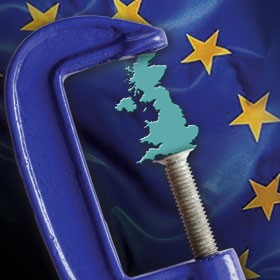Bruges Group Blog
How the "Backstop" breaches international treaties
The backstop is illegal.
When speaking with international lawyers they mention a number of difficulties that the EU will discover if they actually try to implement the backstop.
The competence of the 'Withdrawal' Agreement to establish the backstop exceeds its lawful ability, it is Ultra Vires.
Given indications from the President of the EU Council, Donald Tusk in March and October 2018, that the EU would welcome a Canada-style free trade agreement.1 It is worth emphasizing that such a deal could cover the whole UK unless the "Backstop" in the Withdrawal Agreement is inevitable - which both the UK and EU insist it is not. Indeed, if the Backstop is (or becomes) inevitable it must also be permanent and so, in the view of senior lawyers, the Backstop cannot form part of a deal agreed and approved by the EU under Article 50 TEU and must instead be either moved to the Political Declaration or approved under Article 218 TEU.2
The creation of the backstop is not only a breach of the Withdrawal Agreement's powers but also of the EU's own principles and those of other European and international organisations. In particular it breaches the principle of Self-Determination.
Imposing taxation without representation, via the customs union that the Backstop would establish, is not in keeping with the "European values" so often lauded by the EU, and is best avoided for the sake of good neighbourly relations: More specifically, the Backstop would place the EU-27 in breach of a number of their international obligations, including for example:
- The 1952 Protocol to the European Convention on Human Rights which ensures "the free expression of the opinion of the people in the choice of the legislature";
- The right to self-determination expressed in Article 1 of the UN Charter and expanded upon in various UN Resolutions including: the Principles of International Law Concerning Friendly Relations and Cooperation Among States (UN Resolution 2625(XXV)), the Declaration on the Granting of Independence to Colonial Countries (UN Resolution 1514(XV)), and the International Covenant on Civil and Political Rights (UN Resolution 2200A(XXI));
- and The EU's own treaty provisions, including "good neighbourliness" (Article 8 TEU) and the progressive abolition of trade barriers (Article 3(5) TEU) and citizen's rights to participate in the democratic life of the EU (Article 10(3)).
The issue of the Northern Ireland peace process is often cited by opponents of a sovereign Brexit as a reason to support the 'Withdrawal' Agreement, incorrectly claiming that the Good Friday Agreement mandates that no border infrastructure can be introduced, yet no such provision exists. Leaving aside the fact that it would be the Republic of Ireland, at the behest of the EU, that would be constructing customs posts, it is actually the 'Withdrawal' Agreement that breaches the terms of The 1998 Belfast Agreement.
The 'Withdrawal' Agreement seeks to alter the constitutional relationship between Northern Ireland and the United Kingdom without the express consent of the people of Northern Ireland - a view shared by Lord Trimble (the holder of a Nobel Peace Prize) who was an architect of the original agreement and is now preparing to take the UK Government to Court on that basis.'3
Moreover, as a matter of domestic constitutional law, Martin Howe QC has pointed out that the Backstop is also in breach of Article VI of the Act of Union 1800 which established the United Kingdom of Great Britain and Ireland and which is still in force (Ireland now being Northern Ireland for these purposes).4
1 http://www.cityam.com/264639/donald-tusk-offers-uk-canada-style-trade-deal-blow-theresa
2 see page 2 para 3 of https://sites-herbertsmithfreehills.vuturevx.com/20/19043/landing-pages/a-view-from-brussels-february-2018-briefing(2).pdf
3 https://www.politicshome.com/news/uk/foreign-affairs/brexit/news/101611/good-friday-agreement-architect-lord-trimble-takes
https://www.bbc.co.uk/news/uk-northern-ireland-46293736
https://www.politico.eu/article/david-trimble-to-take-uk-govemment-to-court-over-irish-backstop/
4 https://lawyersforbritain.org/withdrawal-agreement-the-northern-irish-backstop-and-the-constitution-of-the-united-kingdom
Contact us
246 Linen Hall, 162-168 Regent Street
London W1B 5TB
Director : Robert Oulds MA, FRSA
Founder Chairman : Lord Harris of High Cross





